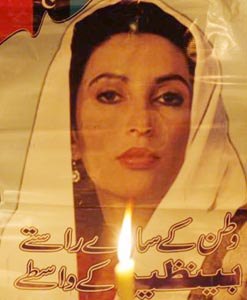http://www.tehrantimes.com
BY: Sharmila Faruqui
Today Pakistanis pay tribute to the inimitable combination of courage, charisma and defiance. The December 27 is a tragic day not only for Pakistan and its people but for all those across the world who truly believe in the ideals of democracy.

Five years after her brutal assassination we are still unable to reconcile with the fact that Benazir Bhutto is no more, but the reality, however nightmarish cannot be blotted out of one’s mind. For long we will remain mired in her memories and her struggle for the revival of democracy in Pakistan. She lived for the poor and died for the poor. Bhutto epitomized courage and courted death because she challenged dictators and tyrants and dare extremists and terrorists. She was a woman swimming against the tide of obscurantism. She died because she represented the aspirations of millions of her countrymen. In her death, Pakistan was robbed of the jewel in its crown. Daughter of the indomitable Zulfiqar Ali Bhutto and a child of privilege her personal and political struggle remains legendry. Zulfiqar Ali Bhutto had championed the cause of the poor and downtrodden and had given a sense of dignity to the common man in Pakistan. Bhutto who rose to become her father’s political successor did the same. The most inspirational woman I have ever met her belief in democracy and freedom as a way of life inspired devotion among her people.
The Pakistan People’s Party is a party of the die-hards. It has always stood against the dictators who robbed the people of their basic right to rule themselves. Zulfiqar Ali Bhutto was martyred because he championed the cause of the common man. Bhutto followed in his footsteps. She challenged the demons of darkness in Pakistan and was the most potent rallying point to combine the forces of Islam and modernism. On her return, she was mobilizing a new politically credible resistance to primitivism.
Bhutto returned to Pakistan in October 2007, after nine years of exile, hopeful that she could be a catalyst for change. Upon a tumultuous reception, she survived a suicide bomb attack that killed nearly two hundred PPP’s stalwarts. But she continued to forge ahead, with more courage and conviction than ever, since she knew that time was running out for the future of her nation. While briefing the media after the attack, she said that it was not an attack on her, but an attack on democracy, and the unity and integrity of Pakistan.
Bhutto challenged the forces of dictatorship and extremism. The restoration of democracy and ridding the country from the clutches of dictatorship were her articles of faith. She was the hope of masses, the downtrodden and the marginalized. Bhutto was martyred on December 27, 2007, while she was leading a political rally in Rawalpindi. All hopes of the extremists to bury her ideals with her physical obliteration have been smashed by her followers, who have vowed to continue the struggle spearheaded by her for democracy and rule of law in Pakistan.
When audiences around the globe hear Bhutto’s dramatic story of democracy and deposal, they are awed by the tireless strength with which she struggled to bring freedom to the people of her country. Bhutto is an icon of the battle for democracy, and stands with only a handful of female executive leaders who have shaped the global events of the last century. During her terms of office, she was faced with an enormous challenge: how to effectively govern a poor, politically factitious and ethnically diverse nation. Bhutto moved swiftly to restore civil liberties and political freedom, suspended under military rule.
Bhutto did great things to her country. She had very strong determination as it can be seen in her life and her decisions. She was demonized by the civil-military oligarchy that has virtually run Pakistan since 1958. Bhutto had the combination of political brilliance, charisma, popular support and international recognition. In the democratization process of Pakistan, Bhutto has played a huge role. She saved her people from the military and brought much advancement in their lives. She was a courageous lady. In 2007, despite the threat of extremists and the hostile government, Bhutto decided to return to her homeland. While commenting on her return, Bhutto said, “Some people may not understand why I left a comfortable life and faced these threats. So many people have sacrificed much for so many things, so many died and so many see me as the hope of liberty. Now I cannot run away from the battle. Dr. Martin Luther King’s phrase comes to my mind: ‘Our lives end when we keep our silence on important issues.’ And I confide myself to my own people by my belief in God.”

No comments:
Post a Comment